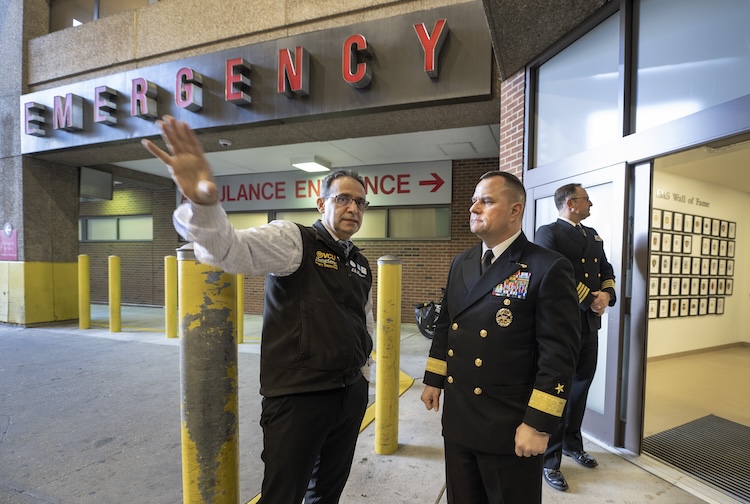
VCU Health and the U.S. Navy’s Fleet Surgical Teams collaborate on transformative military-civilian trauma training and knowledge exchange
VCU Medical Center, in collaboration with the U.S. Navy’s Fleet Surgical Teams, is actively advancing trauma training and knowledge exchange between VCU Health and the military.
February 15, 2024 Michel Aboutanos, M.D., medical director of VCU Medical Center’s Level I trauma center and Trauma Systems Network, meets with Rear Admiral Benjamin Nicholson, Commander of Expeditionary of Strike Group TWO, as part of an ongoing partnership between VCU Health and the U.S. Navy's Fleet Surgical Teams. (VCU Enterprise Marketing and Communications)
Michel Aboutanos, M.D., medical director of VCU Medical Center’s Level I trauma center and Trauma Systems Network, meets with Rear Admiral Benjamin Nicholson, Commander of Expeditionary of Strike Group TWO, as part of an ongoing partnership between VCU Health and the U.S. Navy's Fleet Surgical Teams. (VCU Enterprise Marketing and Communications)
Central to VCU Health's comprehensive programs and its Level I trauma center is the unwavering commitment to zero preventable deaths, both domestically and on the battlefield. Several collaborations with the United States military encompass education opportunities, training programs, clinical skills sustainment, as well as military and trauma-related research projects.
One moment to demonstrate this commitment came late last year when VCU Medical Center answered the call to join forces with the U.S. Navy’s Fleet Surgical Teams (FSTs) to provide trauma training for military members across multiple disciplines. The program is part of VCU Health’s ongoing efforts to support the Military-Civilian Partnership (MCP) and the MISSION Zero Act of 2019.
And within this teaching environment – dedicated to providing high-quality care for the most complex of trauma patients – VCU Health continues to show its ongoing commitment to military members through various MCP initiatives.
Rear Admiral Benjamin Nicholson, Commander of Expeditionary Strike Group TWO along with medical leadership from Commander, Naval Surface Force Atlantic and the Navy’s Atlantic-based Fleet Surgical Teams received a tour of VCU Medical Center’s Level I trauma center in late January. (VCU Enterprise Marketing and Communications)
From vision to reality: Embedding Fleet Surgical Teams
The FSTs training at VCU Health are 15-person teams of general surgeons, hospitalists, nurses, CRNAs, technicians and corpsmen. Each team partnered with clinicians and departments across the medical center to gain experience in high volume and high acuity trauma care.
“Any experience which allows our Navy medical professionals to collaborate with their civilian counterparts is value-added for everyone,” said Rear Admiral Benjamin Nicholson, Commander of Expeditionary of Strike Group TWO. “The data proves it; working alongside the incredibly talented and experienced trauma teams at VCU Health makes our FSTs more capable and more confident in carrying out their vital missions. Together we are working toward a common, achievable, and highly-worthy goal: zero preventable deaths on the battlefield, and at home.”

Answering the call: VCU Health’s agility in response to support military
The discussion between VCU Health and FSTs began in August 2023. However, due to shifting timelines and priorities, the need for a faster launch of the initiative surfaced. In December 2023, Captain Justin Lafreniere, a physician, Officer-in-Charge of Fleet Surgical Team TWO, and Group Surgeon for Expeditionary Strike Group TWO, reached out to Rokayak and Michel Aboutanos, M.D., chief of Acute Care Surgical Services in the Department of Surgery and medical director of VCU Medical Center’s Level I trauma center and Trauma Systems Network, to see if it would be possible to begin training for the first FST in January.
“Their team pulled this off in about 4 weeks, over the holiday period, and now here we are planning our next steps towards a more sustainable partnership between VCU Health and all four of Expeditionary Strike Group TWO's Fleet Surgical Teams,” Captain Lafreniere said. “The experience has not only prepared these sailors to support the next amphibious ready group deployment, but puts us another step closer to having Navy expeditionary medical teams exchanging ideas and bedside expertise with VCU Health staff, with the ultimate goal of improving our care of the communities we serve, on a much more permanent, and long-term basis.”
“We are deeply committed to our military-civilian partnerships,” Aboutanos said. “The success of this collaboration is evident in the completion of the rotations with FST 4 and FST 2, showcasing the rapid and effective implementation of the program by VCU Health team members. This could not have happened without Beth Broering, the trauma and burn program manager’s tireless efforts and the unparalleled commitment of all of our faculty, staff and VCU Health leadership.”
VCU Health's institutional leadership, coupled with a dedicated military-civilian partnership team, has been instrumental in the success of these initiatives. The support from departmental leadership, staff members and liaisons underscores the health system's commitment to bridging the gap between military and civilian health care expertise.
Marlon Levy, M.D., interim CEO of VCU Health, and Michel Aboutanos, M.D., medical director of VCU Medical Center’s Level I trauma center, received a placard from the U.S. Navy in recognition of VCU Health’s partnership to improve trauma care both abroad and at home. (VCU Enterprise Marketing and Communications)





